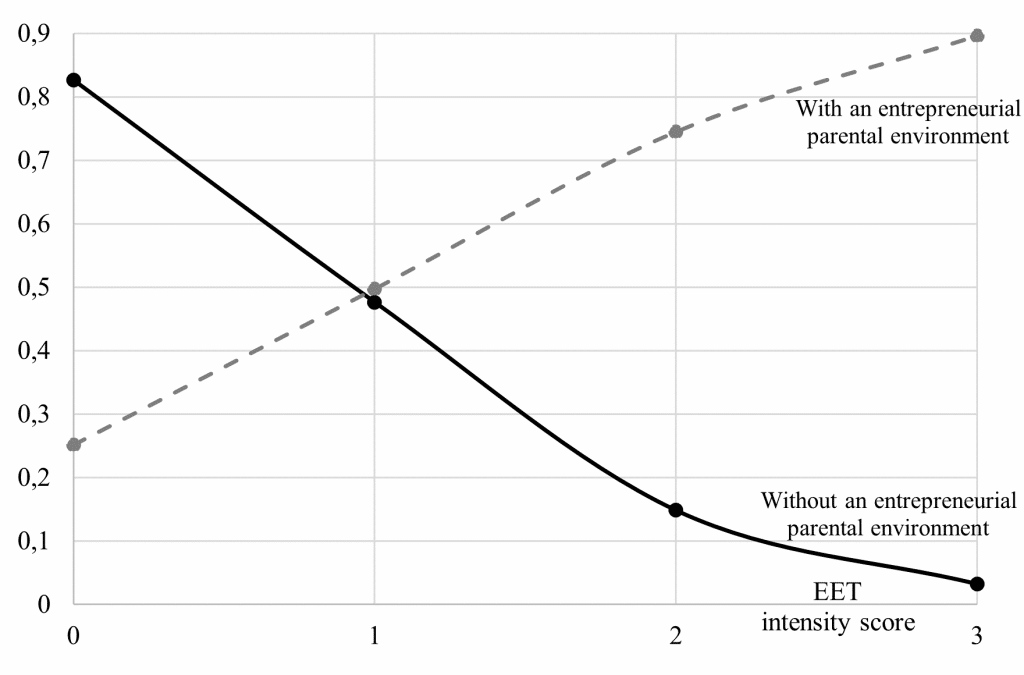Can people be trained to become entrepreneurs?
Widely debated in the literature on Entrepreneurship Education and Training (EET), the question remains unanswered. It is assumed that entrepreneurship education fosters a sense of confidence or belief in people’s capacity to reach entrepreneurial success. This is what academics call “self-efficacy”, and it is a key driver to entrepreneurship intention, implementation and success. However, empirical findings on the outcomes of entrepreneurship education seem to neither confirm nor disprove this assumption. Does entrepreneurship education in fact work? And if so, how does it work?
So far, very few studies have investigated EET impact in the context of actual entrepreneurs. To better understand how EET affects entrepreneurs’ self-efficacy and which level of exposure to entrepreneurial learning is needed to gain substantial benefits, many call for including the entrepreneurial experience as a moderating factor in the development of self-efficacy. Practitioners and scholars commonly agree on the positive effect of experiences gained through either embeddedness in entrepreneurship ecosystems or observation of personal/family role models.
Existing literature on EET has emphasized that entrepreneurship education provides the informational content required by nascent entrepreneurs to acquire enough belief and confidence in their capabilities to engage in entrepreneurship. However, the question remains of the lasting effect of EET.
To contribute to the debate on EET, we surveyed 76 French entrepreneurs to find out whether and to what extent EET is effective in building entrepreneurs’ confidence in their venture success. We decided to moderate our results by focusing our study on experience gained in an entrepreneurial parental environment.
The field perspective from actual entrepreneurs
We surveyed a sample of 76 French entrepreneurs who had created new ventures since less than five years. We measured their entrepreneurial self-efficacy, using three dimensions: their capacity to recognize business opportunities, their entrepreneurial skills and knowledge, and their entrepreneurial self-confidence.
First, we found that the number of entrepreneurial programs attended by entrepreneurs over time does not lead to higher levels of self-efficacy after they have created their new venture. Our results did not show any significant self-efficacy difference between individuals who engage deliberately in multiple EET programs and those who simply attend a few training modules about entrepreneurship.
From an educational perspective, our study does not highlight any significant evidence showing that, after EET programs are over, trainees transfer entrepreneurial knowledge, skills, and techniques into their entrepreneurial activities and behaviors. Similarly, no definitive conclusions can be drawn on the impact of EET on the self-efficacy of actual entrepreneurs.
However, our results offer much more instructive outputs when analyzed in the context of entrepreneurial and non-entrepreneurial parental environments.
On the one hand, we find that when individuals have grown up in an entrepreneurial parental environment, the greater the EET intensity, the greater trained entrepreneurs feel self-efficacious. This finding gives a central role to cultural capital resources, informal entrepreneurship training, and entrepreneurial values and experiences vicariously accumulated in the parental environment. Observing parental role models leads individuals to develop an absorptive capacity on acquiring skills and confidence during multiple EET programs, which in turn enhances entrepreneurial self-efficacy.
On the other hand, when entrepreneurs do not have an entrepreneurial parental figure, the greater the EET intensity, the lower trained entrepreneurs feel self-efficacious. For them, prior exposure to multiple EET programs combined with their ongoing entrepreneurial experience leads to a substantial deterioration in their self-efficacy. Surprisingly, the intense exposure to entrepreneurial learning did not allow them to develop a higher self-consciousness about the hurdles and constraints of entrepreneurial venturing. Because of this absence of an entrepreneurial parental environment, they do not have the necessary cultural capital resources, informal entrepreneurship education, and entrepreneurial values that would have allowed them to fully benefit from the entrepreneurial knowledge taught during EET programs. They consequently could not transform this knowledge into perception of self-efficacy. Awareness of the challenges and difficulties inherent to entrepreneurial venturing, which is developed within an entrepreneurial parental environment, is lacking for these trained entrepreneurs.
Entrepreneurs who have grown up in an entrepreneurial parental environment are positively impacted by intense EET programs

Implications for entrepreneurship education
Our study contributes to the major debates mobilizing both academics and practitioners about the critical questions: can people be trained to become entrepreneurs? If EET works, how does it work?
Our results provide guidance on how to effectively design EET programs to enhance nascent and actual entrepreneurs’ self-efficacy. Given the central role of an entrepreneurial parental environment in developing self-efficacy, they suggest that, in addition to teaching traditional entrepreneurial academic content, EET programs should allow students to experience the entrepreneur’s curriculum through in-depth role modeling. More precisely, this role modeling should go beyond mere testimonials and engage students in trusted, intense, and repeated interactions with inspiring instructors, both entrepreneurs and lecturers—what about a two-voice teaching?—to create and activate the fostering conditions of an entrepreneurial (parental) environment. The physical location of entrepreneurship teaching should allow the trainees to feel, observe and in fact start experiencing the life of entrepreneurs. Classrooms may be located inside incubators or co-working spaces where trainees would bump into “real” entrepreneurs during breaks or after courses.
In simulating quasi-parental role modeling within EET programs, academic institutions can contextualize the positive impact of EET on entrepreneurial venturing.


